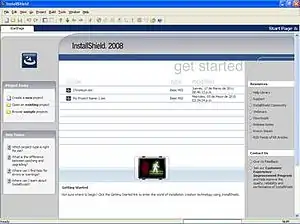InstallShield
InstallShield is a proprietary software tool for creating installers or software packages. InstallShield is primarily used for installing software for Microsoft Windows desktop and server platforms, though it can also be used to manage software applications and packages on a variety of handheld and mobile devices.
 | |
 InstallShield 2008 interface | |
| Original author(s) | Viresh Bhatia and Rick Harold |
|---|---|
| Developer(s) | Flexera Software |
| Stable release | 2019
/ April 18, 2019 |
| Operating system | Microsoft Windows |
| Type | Setup creator |
| License | Shareware |
| Website | installshield |
Features
InstallShield generates a .msi file which can be used on the destination computer in order to install the payloads from the source computer where it was created. It is possible to specify questions, set prerequisites and registry settings that the user will be able to choose at the installation time.
Development
InstallShield was originally developed by The Stirling Group, a company founded in 1987 by Viresh Bhatia and Rick Harold, who had first met when they were computer science students at Northwestern University. Their first office was a small room in the basement of an old library building in Roselle, Illinois. They were to market a geographic mapping software, but it was never released.[1] By 1990, The Stirling Group was selling a package of six products called the Shield Series.[2] In that same year, the company also released the InstallShield product to developers.[3][4]
In 1993, The Stirling Group moved into larger offices in Schaumburg, Illinois and changed the companies name to Stirling Technologies, Inc. InstallShield became particularly well known after Microsoft endorsed it for use in Windows 95, and by 1997 Stirling Technologies estimated that it was being used in 85 to 90 percent of all software products written for Windows.[3][4] Since 1996, the company operated under the InstallShield name until Macrovision acquired the business in 2004 for $76 million in cash plus an additional $20 million based on meeting sales targets.[5]
Limited versions of InstallShield were at various times bundled with popular software development packages such as Microsoft Visual Studio 6.0, Borland Delphi 2006, and Borland C++Builder.
On 1 April 2008, the Macrovision Software Business Unit (including the InstallShield brand) was sold to private equity firm Thoma Cressey Bravo, forming a new company called Acresso Software.[6] In October 2009, Acresso Software changed its name to Flexera Software.[7]
In May 2020, Flexera rebranded its software division as Revenera.[8]
See also
References
- "The Stirling Group". The Electronic Developer Magazine for OS/2. Archived from the original on 11 September 2016. Retrieved 29 August 2016.
- Mann, Leslie (1 March 1998). "Meet The Original Installshield Wizards". Chicago Tribune. Archived from the original on 9 August 2016. Retrieved 21 November 2019.
- Schmitt, Anne (5 November 1997). "Schaumburg Company makes it possible to open windows". Daily Herald. p. 40. Archived from the original on 12 August 2016. Retrieved 17 June 2016 – via Newspapers.com.
- Schmitt, Anne (5 November 1997). "Schaumburg Company makes it possible to open windows". Daily Herald. p. 41. Archived from the original on 13 August 2016. Retrieved 17 June 2016 – via Newspapers.com.
- Rose, Barbara (18 June 2004). "Software installer may fetch $96 million". Chicago Tribune. Archived from the original on 18 August 2017. Retrieved 17 August 2017.
- "Thoma Bravo Completes Acquisition of Macrovision's Software Business Unit". Flexera Software. 1 April 2008. Archived from the original on 18 August 2017. Retrieved 17 August 2017.
- Lai, Eric (9 October 2009). "Acresso who? Macrovision spinoff changes name, again". Computerworld. Archived from the original on 18 August 2017. Retrieved 17 August 2017.
- "Introducing Revenera: Flexera Rebrands Its Division Serving Software and IoT Companies". 28 May 2020.